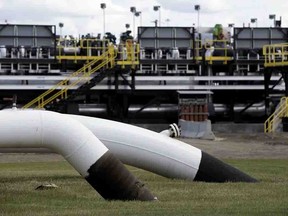
Article content
The world is short on reliable energy and long on instability. Tankers edge through choke points like the Strait of Hormuz. Wars threaten pipelines and power grids. Markets flinch with every headline. As authoritarian regimes rattle sabres and weaponize supply chains, the global appetite for energy from stable, democratic, responsible producers has never been greater.
THIS CONTENT IS RESERVED FOR SUBSCRIBERS ONLY
Subscribe now to read the latest news in your city and across Canada.
- Exclusive articles from Barbara Shecter, Joe O'Connor, Gabriel Friedman, and others.
- Daily content from Financial Times, the world's leading global business publication.
- Unlimited online access to read articles from Financial Post, National Post and 15 news sites across Canada with one account.
- National Post ePaper, an electronic replica of the print edition to view on any device, share and comment on.
- Daily puzzles, including the New York Times Crossword.
SUBSCRIBE TO UNLOCK MORE ARTICLES
Subscribe now to read the latest news in your city and across Canada.
- Exclusive articles from Barbara Shecter, Joe O'Connor, Gabriel Friedman and others.
- Daily content from Financial Times, the world's leading global business publication.
- Unlimited online access to read articles from Financial Post, National Post and 15 news sites across Canada with one account.
- National Post ePaper, an electronic replica of the print edition to view on any device, share and comment on.
- Daily puzzles, including the New York Times Crossword.
REGISTER / SIGN IN TO UNLOCK MORE ARTICLES
Create an account or sign in to continue with your reading experience.
- Access articles from across Canada with one account.
- Share your thoughts and join the conversation in the comments.
- Enjoy additional articles per month.
- Get email updates from your favourite authors.
THIS ARTICLE IS FREE TO READ REGISTER TO UNLOCK.
Create an account or sign in to continue with your reading experience.
- Access articles from across Canada with one account
- Share your thoughts and join the conversation in the comments
- Enjoy additional articles per month
- Get email updates from your favourite authors
Sign In or Create an Account
or
Article content
Article content
Canada checks every box: vast reserves, rigorous environmental standards, rule of law and a commitment to Indigenous partnership. We should be leading the race, but instead we’ve effectively tied our own shoelaces together.
Article content
Article content
By signing up you consent to receive the above newsletter from Postmedia Network Inc.
Article content
In 2024, Canada set new records for oil production and exports. Alberta alone pumped nearly 1.5 billion barrels, a 4.5 per cent increase over 2024. With the Trans Mountain Expansion (TMX) online, we have new access to Pacific markets and Asia has responded, with China now a top buyer of Canadian crude.
Article content
That’s the good news.
Article content
The bad is that we’re limiting where energy can leave the country. Bill C-48, the so-called tanker ban, prohibits tankers carrying over 12,500 tons of crude oil from stopping or unloading crude at ports or marine installations along B.C.’s northern coast. That includes Kitimat and Prince Rupert, two ports with strategic access to Indo-Pacific markets. Yes, we must do all we can to mitigate risks to Canada’s coastlines, but this should be balanced against a need to reduce our reliance on trade with the U.S. and increase our access to global markets.
Article content
Article content
Add to that the Impact Assessment Act (IAA) which was designed in part to shorten approval times and add certainty about how long the process would take. It has not had that effect and it’s scaring off investment. Business confidence in Canada has dropped to pandemic-era lows, due in part to unpredictable rules.
Article content
Article content
At a time when Canada is facing a modest recession and needs to attract private capital, we’ve made building trade infrastructure feel like trying to drive a snowplow through molasses.
Article content
What’s needed isn’t revolutionary, just practical. A start would be to maximize the amount of crude transported through the Trans Mountain Expansion pipeline, which ran at 77 per cent capacity in 2024. Under-utilization is attributed to a variety of factors, one of which is higher tolls being charged to producers.
Article content
Canada also needs to overhaul the IAA and create a review system that’s fast, clear and focused on accountability, not red tape. Investors need to know where the goalposts are. And, while we are making recommendations, strategic ports like Prince Rupert should be able to participate in global energy trade under the same high safety standards used elsewhere in Canada.

.jpg) 3 hours ago
2
3 hours ago
2
 English (US)
English (US)